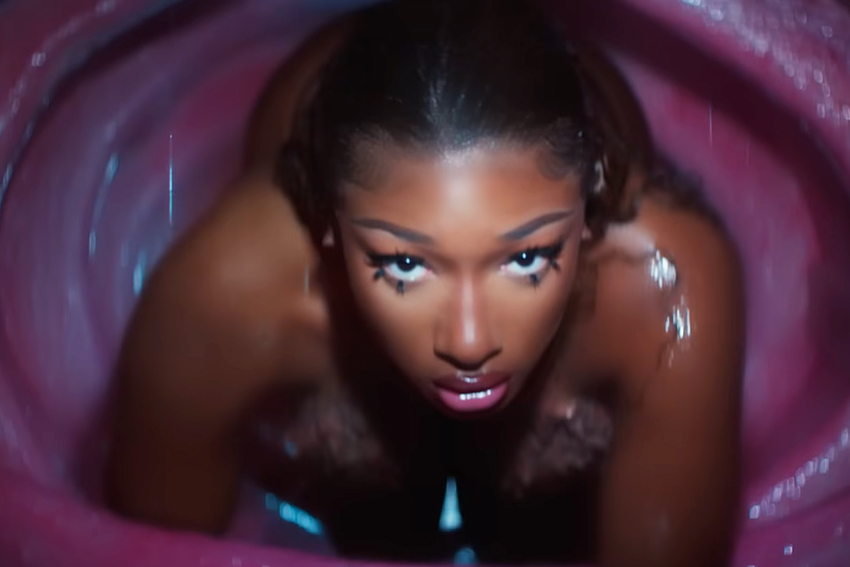“Just as a snake sheds its skin,” Megan Thee Stallion proclaims in her new single “Cobra,” “we must shed our past, over and over again.” In the video for “Cobra,” her first single since 2022 and the first since Tory Lanez was sentenced to 10 years for shooting her, Megan emerges warily and nearly nude from the cavernous insides of a cobra. But instead of hitting us with her signature braggadocio, the 28-year-old spits dark truths about her ongoing emotional pain and mental health crises: “Breakin’ down and I had the whole world watchin’, but the worst part is really who watched me. Every night I cried, I almost died, and nobody close tried to stop it.”
In another scene, we see Megan trapped inside a display case, peeling dead skin from her face and fully naked body as serpentine human spectators silently record her molting. Each bar lays bare a tortuous torment: the death of her parents, being cheated on and exploited, alcoholism, sleeplessness, anxiety, depression and thoughts of self-harm. She pleads, “Lord, give me a break. I don’t know how much more of this s— I can take.”
The video reportedly racked up a staggering 2.14 million views in a day, becoming the most-watched YouTube debut in 24 hours by a solo woman hip-hop artist this year. (It had 7 million views a week later.) All those who’ve viewed the video have witnessed one of the music industry’s most acclaimed and renowned Black women artists confess, “Yes, I’m very depressed. How can somebody so blessed wanna slit they wrist?”

With the possible exception of Meghan Markle, who said she experienced suicidal ideation while living with the royals and dealing with the British media, I can’t recall any other Black woman’s story of her mental health crises receiving this much attention. With “Cobra,” Megan Thee Stallion has thrown a long-overdue floodlight on an urgent mental health crisis hiding in plain sight: the rate of suicide among Black women, particularly successful Black women.
A new study from Boston University Chobanian & Avedisian School of Medicine and Howard University that looked only at women in the U.S. found that Black women aged 18 to 65 “have the highest risk for suicide irrespective of their socioeconomic status.” In fact, the study found that Black women in the highest income strata, those considered “blessed” like Megan, had a 20% increase in the odds of suicide and self-inflicted injury compared to white women in the lowest socioeconomic strata.
Black women in the highest income strata had a 20% increase in the odds of suicide and self-inflicted injury compared to white women in the lowest socioeconomic strata.
“Our findings were surprising because most studies usually show that the rate of suicide was higher in white women in the U.S. However, when we begin to look at the intersection of race and income, a different picture begins to emerge,” corresponding author Temitope Ogundare explained in a statement.
In the span of three years, she was shot and injured by a former friend, and discredited, aggressively smeared, cyberbullied and ridiculed by the person who assaulted her. Many of her industry peers, the general public, and even some of her own team and longtime friends accused her of lying. Then she was dragged through her assaulter’s widely publicized circus of a trial. All that occurred when she was in a feud with her old label, 1501 Entertainment, that lasted for years.
She’d already lost both her parents. She lost her father when she was 15. Then, in her early 20s, a month before she scored her first Billboard entry with 2019’s “Big Ol’ Freak,” she lost her mom, a former rapper who inspired her daughter’s love for hip-hop and doubled as a manager. She lost her grandmother the same month she lost her mother. “Man, I miss my parents,” she raps on “Cobra.”
Megan’s new release may be some people’s introduction to her vulnerable and forthcoming lyrics about hitting rock bottom, but it’s far from her first.

Last year, Megan disclosed how she was feeling after Tory Lanez shot her. “New people, I probably don’t even hold a conversation longer than 30 minutes because I feel like every time I’m talking, I’m like on the verge of tears, and I don’t wanna have to explain to strangers why I’m crying,” she told Gayle King in her first interview since the 2020 shooting. “It’s too much. I feel crazy. I’m sad. And I feel like I have to hold it in because I have to be strong for so many people.”













